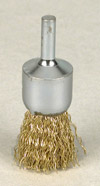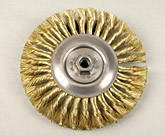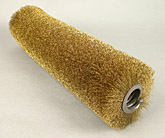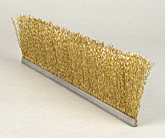Brass Wire Brushes
 Brass wire is softer than steel wire or stainless steel wire, and offers a brushing action that will not scratch harder metals. Our brass wire is Alloy 260, composed of 70% Copper and 30% Zinc. If your work-piece is either brass or copper, then brass wire is the most suitable choice. Brass wire (as well as bronze wire) will not generate sparks when struck against other metallic surfaces, and is suitable for hazardous environments (1) . Brass wire is also an excellent conductor of electrical energy (28% IACS), and is suitable for static reduction applications when incorporated into a brass wire strip brush. Brass is appropriate for operating environments up to 300°F constant temperature. Brass wire is also relatively corrosion resistant.
Brass wire is softer than steel wire or stainless steel wire, and offers a brushing action that will not scratch harder metals. Our brass wire is Alloy 260, composed of 70% Copper and 30% Zinc. If your work-piece is either brass or copper, then brass wire is the most suitable choice. Brass wire (as well as bronze wire) will not generate sparks when struck against other metallic surfaces, and is suitable for hazardous environments (1) . Brass wire is also an excellent conductor of electrical energy (28% IACS), and is suitable for static reduction applications when incorporated into a brass wire strip brush. Brass is appropriate for operating environments up to 300°F constant temperature. Brass wire is also relatively corrosion resistant.
Popular Applications for Brass Wire brushes:
 Cleaning plastic extrusion parts, including molds, dies, and extruder barrels
Cleaning plastic extrusion parts, including molds, dies, and extruder barrels- Cleaning machine parts where sparks might pose a risk of fire or explosion
- Cleaning metal parts without removing any of the base material.
- Satin finishing aluminum extrusions or sheet
- Static reduction brushes for industrial environments
 Spiral Brush manufactures and sells brass brushes in the following forms: wheel brushes, cup brushes, end brushes, twisted knot wheel brushes, twisted knot cup brushes, strip brush, spiral wound cylinder brushes, twisted in wire tube brushes, maintenance brushes, scratch brushes, and stapleset cylinder brushes.
Spiral Brush manufactures and sells brass brushes in the following forms: wheel brushes, cup brushes, end brushes, twisted knot wheel brushes, twisted knot cup brushes, strip brush, spiral wound cylinder brushes, twisted in wire tube brushes, maintenance brushes, scratch brushes, and stapleset cylinder brushes.
 Spiral Brush offers brushes made from the following sizes and types of brass wire:
Spiral Brush offers brushes made from the following sizes and types of brass wire:
- Crimped brass wire from 0.004″ to .0204″ in diameter
- Level brass wire for twisted knot brushes or stapleset brushes in 0.014″, 0.016″, and 0.0204″ diameters.
(1) Other components of a brass wire brush, such as the steel sideplate, cup or shank, might not provide the same non-sparking protection, so be sure to evaluate the entire brush and its interaction with the application before using the brush in a hazardous environment.